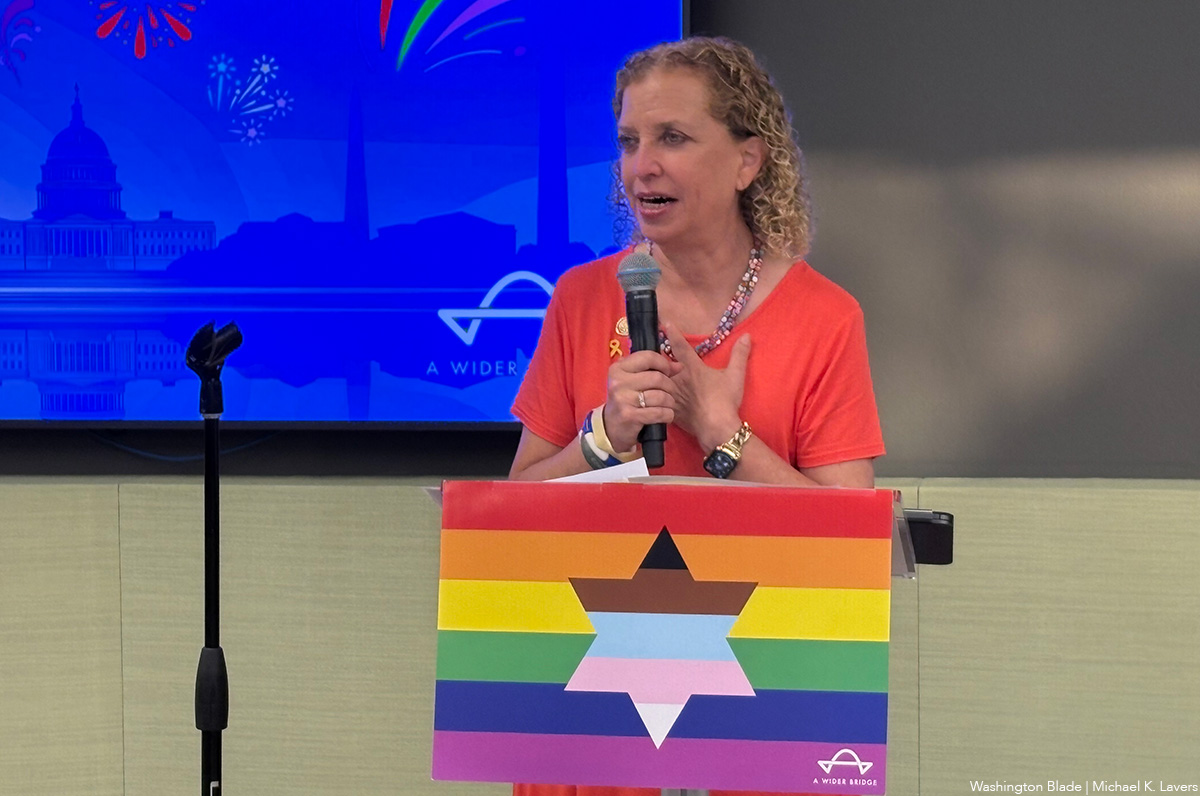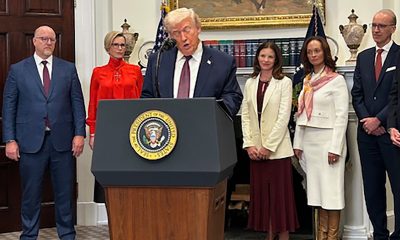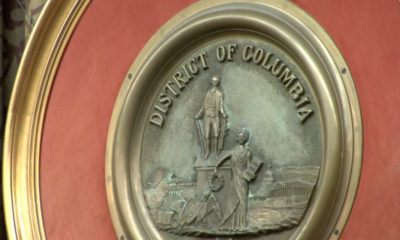National
Manning found guilty of lesser charges
LGBT advocates say gay soldier’s actions unrelated to his sexual orientation


Pfc. Bradley Manning was acquitted of aiding-the-enemy, the most serious charge brought against him. (Public domain photo)
A military judge on Tuesday found gay U.S. Army private Bradley Manning not guilty of aiding the enemy, the most serious charge lodged against him following allegations in 2010 that he leaked hundreds of thousands of classified military reports and diplomatic cables.
At the conclusion of a court martial proceeding that began in June at Fort Meade, Md., Army Col. Denise Lind found Manning guilty of nearly all of the other charges filed against him, including six counts of violating the U.S. Espionage Act. All of the charges stemmed from his alleged transmittal of the classified documents to the dissident, whistleblower group Wikileaks.
The verdict came after Manning pleaded guilty earlier this year to 10 of the 22 counts filed against him. Experts in military law said the charges on which he was convicted carry a combined maximum sentence of 136 years of confinement in a military prison, although they expect the judge to hand down a much shorter sentence.
Had he been convicted on the aiding-the-enemy charge, he could have faced life in prison without the possibility of parole.
LGBT activists following the Manning case dispute press reports that surfaced at the time of his arrest in 2010 that his motive for leaking the classified information was related, in part, to his anger over the military’s Don’t Ask, Don’t Tell law, which banned gays from serving openly in the armed forces.
Transgender advocates have also expressed skepticism of a claim by one of Manning’s defense attorneys that his action was due, in part, to his personal struggle over his gender identity. The attorney and others who know Manning noted that he referred to himself for a short period of time with a female name and downloaded information over the internet about gender identity disorder.
“I don’t see that his identity has anything to do with what he did,” said Maryland transgender advocate Dana Beyer. “His sexual identity, however you want to define it, is completely irrelevant.”
Beyer’s assessment appears to be shared by virtually all of the national LGBT advocacy organizations, which have either remained silent on the Manning case or have said Manning’s actions should not be condoned and don’t reflect the views of the LGBT rights movement.
That view surfaced in the news in the spring of this year when the San Francisco LGBT Pride committee rejected a proposal to name Manning as a grand marshal for the city’s Pride parade.
Fred Sainz, vice president of communications for the Human Rights Campaign, the nation’s largest LGBT political organization, told the Blade this week that HRC would have no comment on the Manning verdict.
Spokespersons for the National Gay and Lesbian Task Force and the Gay and Lesbian Alliance Against Defamation (GLAAD), which monitors media coverage of the LGBT community, did not respond to a request for comment by press time.
D.C. gay attorney Philip Fornaci is among the small corps of LGBT activists who have joined opponents of U.S. policies in the Middle East and elsewhere that have supported Manning and helped raise money for his legal defense.
Supporters argue that Manning is a whistle blower who courageously released information showing a flawed and illegal U.S. foreign policy to enable the American public to pressure the government to change those policies.
“While the national LGBT advocacy organizations shamelessly shower President Obama with praise for allowing openly gay men and women to enlist in the military, their complete silence on the Manning case is indefensible,” Fornaci said in an Aug. 6, 2012 commentary in the Blade. “If Manning did in fact leak information to Wikileaks as he is accused, he has displayed enormous courage.”
Presenting a far different perspective on Manning was R. Clarke Cooper, former executive director of the national gay group Log Cabin Republicans. Cooper, a combat veteran of the Iraq War and current civilian intelligence officer in the Army Reserves, penned a Blade commentary in December 2011 calling Manning “a traitor to the United States of America.”
Responding to early reports, which have since been disputed — that Manning might seek to use his opposition to Don’t Ask, Don’t Tell as a defense for leaking classified documents — Cooper called such a defense a “betrayal of all gay and lesbian service members past and present.”
He added, “Whatever his reasons or excuses, Bradley Manning does not deserve the sympathy of the LGBT community.”
Peter Rosenstein, a gay Democratic activist and supporter of the Obama administration, expressed a similar view opposing LGBT support for Manning.
“I don’t believe the fact that Manning is gay has anything to do with his case,” Rosenstein told the Blade. “What he did was wrong, maybe even treasonous. Making him a gay hero as they tried to do in San Francisco is absurd.”
Shortly after his 2010 arrest, the publicly viewable part of Manning’s Facebook profile listed the Washington Blade as among his ‘favorite’ pages along with several other LGBT-related websites, including the Human Rights Campaign, gay then U.S. Rep. Barney Frank (D-Mass.), and a site pushing for repeal of Don’t Ask, Don’t Tell.
The anti-gay Family Research Council cited reports of Manning’s backing of gay rights causes to support its strong opposition to repealing Don’t Ask, Don’t tell.
D.C. gay blogger John Aravosis reported that no evidence was found to show Manning leaked classified information because he was upset over Don’t Ask, Don’t Tell or supported gay rights.
A national group called the Bradley Manning Support Network, whose members have corresponded with Manning and members of Manning’s family, has said Manning’s motive for releasing classified documents was a desire to correct what he believed to be a harmful U.S. foreign policy.

A Wider Bridge on Friday announced it will shut down at the end of the month.
The group that “mobilizes the LGBTQ community to fight antisemitism and support Israel and its LGBTQ community” in a letter to supporters said financial challenges prompted the decision.
“After 15 years of building bridges between LGBTQ communities in North America and Israel, A Wider Bridge has made the difficult decision to wind down operations as of Dec. 31, 2025,” it reads.
“This decision comes after challenging financial realities despite our best efforts to secure sustainable funding. We deeply appreciate our supporters and partners who made this work possible.”
Arthur Slepian founded A Wider Bridge in 2010.
The organization in 2016 organized a reception at the National LGBTQ Task Force’s Creating Change Conference in Chicago that was to have featured to Israeli activists. More than 200 people who protested against A Wider Bridge forced the event’s cancellation.
A Wider Bridge in 2024 urged the Capital Pride Alliance and other Pride organizers to ensure Jewish people can safely participate in their events in response to an increase in antisemitic attacks after Hamas militants attacked Israel on Oct. 7, 2023.
The Jewish Telegraphic Agency reported authorities in Vermont late last year charged Ethan Felson, who was A Wider Bridge’s then-executive director, with lewd and lascivious conduct after alleged sexual misconduct against a museum employee. Rabbi Denise Eger succeeded Felson as A Wider Bridge’s interim executive director.
A Wider Bridge in June honored U.S. Rep. Debbie Wasserman Schultz (D-Fla.) at its Pride event that took place at the Capital Jewish Museum in D.C. The event took place 15 days after a gunman killed two Israeli Embassy employees — Yaron Lischinsky and Sarah Milgrim — as they were leaving an event at the museum.
“Though we are winding down, this is not a time to back down. We recognize the deep importance of our mission and work amid attacks on Jewish people and LGBTQ people – and LGBTQ Jews at the intersection,” said A Wider Bridge in its letter. “Our board members remain committed to showing up in their individual capacities to represent queer Jews across diverse spaces — and we know our partners and supporters will continue to do the same.”
Editor’s note: Washington Blade International News Editor Michael K. Lavers traveled to Israel and Palestine with A Wider Bridge in 2016.
The White House
‘Trump Rx’ plan includes sharp cuts to HIV drug prices
President made announcement on Friday

President Donald Trump met with leaders from some of the world’s largest pharmaceutical companies at the White House on Friday to announce his new “Trump Rx” plan and outline efforts to reduce medication costs for Americans.
During the roughly 47-minute meeting in the Roosevelt Room, Trump detailed his administration’s efforts to cut prescription drug prices and make medications more affordable for U.S. patients.
“Starting next year, American drug prices will come down fast, furious, and will soon be among the lowest in the developed world,” Trump said during the meeting. “For decades, Americans have been forced to pay the highest prices in the world for prescription drugs by far … We will get the lowest price of anyone in the world.”
Trump signed an executive order in May directing his administration “to do everything in its power to slash prescription drug prices for Americans while getting other countries to pay more.”
“This represents the greatest victory for patient affordability in the history of American health care, by far, and every single American will benefit,” he added.
Several pharmaceutical executives stood behind the president during the announcement, including Sanofi CEO Paul Hudson, Novartis CEO Vas Narasimhan, Genentech CEO Ashley Magargee, Boehringer Ingelheim (USA) CEO Jean-Michel Boers, Gilead Sciences CEO Dan O’Day, Bristol Myers Squibb General Counsel Cari Gallman, GSK CEO Emma Walmsley, Merck CEO Robert Davis, and Amgen Executive Vice President Peter Griffith.
Also in attendance were Health and Human Services Secretary Robert F. Kennedy Jr., Commerce Secretary Howard Lutnick, Centers for Medicare and Medicaid Services Administrator Mehmet Oz, and Food and Drug Administration Commissioner Marty Makary.
Under the Trump Rx plan, the administration outlined a series of proposed drug price changes across multiple companies and therapeutic areas. Among them were reductions for Amgen’s cholesterol-lowering drug repatha from $573 to $239; Bristol Myers Squibb’s HIV medication reyataz from $1,449 to $217; Boehringer Ingelheim’s type 2 diabetes medication jentadueto from $525 to $55; Genentech’s flu medication xofluza from $168 to $50; and Gilead Sciences’ hepatitis C medication epclusa from $24,920 to $2,425.
Additional reductions included several GSK inhalers — such as the asthma inhaler advair diskus 500/50, from $265 to $89 — Merck’s diabetes medication januvia from $330 to $100, Novartis’ multiple sclerosis medication mayzent from $9,987 to $1,137, and Sanofi’s blood thinner plavix from $756 to $16. Sanofi insulin products would also be capped at $35 per month’s supply.
These prices, however, would only be available to patients who purchase medications directly through TrumpRx. According to the program’s website, TrumpRx “connects patients directly with the best prices, increasing transparency, and cutting out costly third-party markups.”
Kennedy spoke after Trump, thanking the president for efforts to lower pharmaceutical costs in the U.S., where evidence has shown that drug prices — including both brand-name and generic medications — are nearly 2.78 times higher than prices in comparable countries. According to the Pharmaceutical Research and Manufacturers of America, roughly half of every dollar spent on brand-name drugs goes to entities that play no role in their research, development, or manufacturing.
“This is affordability in action,” Kennedy said. “We are reversing that trend and making sure that Americans can afford to get the life-saving solutions.”
Gilead CEO Dan O’Day also spoke about how the restructuring of drug costs under TrumpRx, combined with emerging technologies, could help reduce HIV transmission — a virus that, if untreated, can progress to AIDS. The LGBTQ community remains disproportionately affected by HIV.
“Thank you, Mr. President — you and the administration,” O’Day said. “I think this objective of achieving the commitment to affordability and future innovation is extraordinary … We just recently launched a new medicine that’s only given twice a year to prevent HIV, and we’re working with Secretary Kennedy and his entire team, as well as the State Department, as a part of your strategy to support ending the epidemic during your term.
“I’ve never been more optimistic about the innovation that exists across these companies and the impact this could have on America’s health and economy,” he added.
Trump interjected, asking, “And that’s working well with HIV?”
“Yes,” O’Day replied.
“It’s a big event,” Trump said.
“It literally prevents HIV almost 100 percent given twice a year,” O’Day responded.
A similar anti-HIV medication is currently prescribed more than injectable form mentioned by O’Day. PrEP, is a medication regimen proven to significantly reduce HIV infection rates for people at high risk. Without insurance, brand-name Truvada can cost roughly $2,000 per month, while a generic version costs about $60 per month.
Even when medication prices are reduced, PrEP access carries additional costs, including clinic and laboratory fees, office visits, required HIV and sexually transmitted infection testing, adherence services and counseling, and outreach to potentially eligible patients and providers.
According to a 2022 study, the annual total cost per person for PrEP — including medication and required clinical and laboratory monitoring — is approximately $12,000 to $13,000 per year.
The TrumpRx federal platform website is now live at TrumpRx.gov, but the program is not slated to begin offering reduced drug prices until January.
The White House
EXCLUSIVE: Democracy Forward files FOIA lawsuit after HHS deadnames Rachel Levine
Trans former assistant health secretary’s name changed on official portrait

Democracy Forward, a national legal organization that works to advance democracy and social progress through litigation, policy and public education, and regulatory engagement, filed a lawsuit Friday in federal court seeking to compel the U.S. Department of Health and Human Services to release information related to the alteration of former Assistant Secretary for Health Adm. Rachel Levine’s official portrait caption.
The lawsuit comes in response to the slow pace of HHS’s handling of multiple Freedom of Information Act requests — requests that federal law requires agencies to respond to within 20 working days. While responses can take longer due to backlogs, high request volumes, or the need for extensive searches or consultations, Democracy Forward says HHS has failed to provide any substantive response.
Democracy Forward’s four unanswered FOIA requests, and the subsequent lawsuit against HHS, come days after someone in the Trump-Vance administration changed Levine’s official portrait in the Hubert H. Humphrey Building to display her deadname — the name she used before transitioning and has not used since 2011.
According to Democracy Forward, HHS “refused to release any records related to its morally wrong and offensive effort to alter former Assistant Secretary for Health Admiral Rachel Levine’s official portrait caption.” Levine was the highest-ranking openly transgender government official in U.S. history and served as assistant secretary for health and as an admiral in the U.S. Public Health Service Commissioned Corps from 2021 to 2025.
Democracy Forward President Skye Perryman spoke about the need to hold the Trump-Vance administration accountable for every official action, especially those that harm some of the most targeted Americans, including trans people.
“The question every American should be asking remains: what is the Trump-Vance administration hiding? For an administration that touts its anti-transgender animus and behavior so publicly, its stonewalling and silence when it comes to the people’s right to see public records about who was behind this decision is deafening,” Perryman said.
“The government’s obligation of transparency doesn’t disappear because the information sought relates to a trailblazing former federal official who is transgender. It’s not complicated — the public is entitled to know who is making decisions — especially decisions that seek to alter facts and reality, erase the identity of a person, and affect the nation’s commitment to civil rights and human dignity.”
“HHS’s refusal to respond to these lawful requests raises more serious concerns about transparency and accountability,” Perryman added. “The public has every right to demand answers — to know who is behind this hateful act — and we are going to court to get them.”
The lawsuit also raises questions about whether the alteration violated federal accuracy and privacy requirements governing Levine’s name, and whether the agency improperly classified the change as an “excepted activity” during a lapse in appropriations. By failing to make any determination or produce any records, Democracy Forward argues, HHS has violated its obligations under federal law.
The case, Democracy Forward Foundation v. U.S. Department of Health and Human Services, was filed in the U.S. District Court for the District of Columbia. The legal team includes Anisha Hindocha, Daniel McGrath, and Robin Thurston.
The Washington Blade reached out to HHS, but has not received any comment.
The lawsuit and four FOIA requests are below:
-

 Opinions5 days ago
Opinions5 days ago2026 elections will bring major changes to D.C. government
-

 Kazakhstan5 days ago
Kazakhstan5 days agoKazakh Senate approves anti-LGBTQ propaganda bill
-

 District of Columbia4 days ago
District of Columbia4 days agoNew queer bar Rush beset by troubles; liquor license suspended
-

 Letter-to-the-Editor5 days ago
Letter-to-the-Editor5 days agoCandidates should pledge to nominate LGBTQ judge to Supreme Court




















